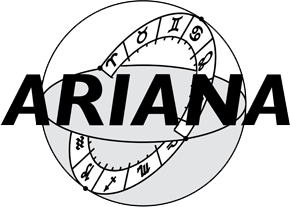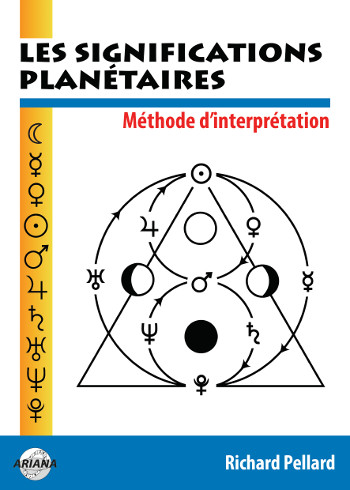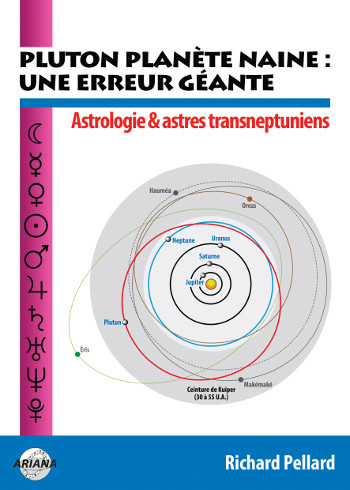Your Planets
Portraits of the Planets
Aspects between Planets
The planetary ages
The planetary families
Planets in Signs
The Planets in comics


The interpretation examples that we are suggesting are very far from being exhaustive: they only show and outline a general frame describing the issues of the planetary family. They should therefore not be taken literally. Each being brings indeed its own responses, more or less original, to the questions raised by a planetary family. There is no magic formula. Through using the R.E.T. and of the Theory of Ages and combining logic, observation and imagination, you will be able to develop a thousand other possible meanings, a thousand other variations on the same theme.
How the unknown, the unconscious, the underlying, the invisible, the hidden, the mysterious, the profound, the imaginary reproduce and maintain themselves (‘t’) by conditioning and subtly determining the way we are moved, perceive, act, feel and experience (‘e’) and to affirm, to say, to simplify and to decide (‘r’).
Positive formula (‘T’ ou “big T” or “extensive T”): To act, to determine oneself and to decide according to long maturations which manifest themselves in the form of sudden impulses, intuitions and irrepressible injunctions. Give free rein to your rich and fertile imagination, connected to the complexity and multiplicity of beings, things and situations, to know what you are going to say and do. Rely on your instincts and your inspiration to guide your life and forge your convictions. To be secretive, mysterious and unpredictable in his behaviors and positions, sometimes wavering, sometimes dazzling. Illustrate, through his experience and his projects, his deepest and least demonstrable certainties. Modeling one’s experience and one’s ideas according to vast collective currents of which one is, says and feels the interpreter.
Negative formula (“non-R, non-E” or lack of Extensive representation and Extensive existence): lack or rejection of spontaneous sociability and concreteness. Relaxation and realism are down. Hence the excesses ‘T’: suggestibility to spells and chimeras of the imagination or to utopian or fantastical ideologies, various regulations due to an inconsiderate intuitionism.
There are words which are immediately so loaded with meaning and various connotations that they run the risk of masking or betraying the thing they designate rather than illuminating it, revealing it. Word “Transcendence” is one of those. evoking a mysterious dimension of the universe, he also flirts with metaphysics and the divine, and thus finds himself exposed to all sorts of more or less arbitrary or fantastical projections. Let us therefore specify the definition that we give to this word: it is quite simply that of the Little Larousse : “Character of that which lies beyond the reach of human experience and thought.”
Note that this definition is privative or negative: Transcendence is not described there as what it is, but as what it is not. The “This” that designates it is vast and vague enough to allow us to imagine multiple forms and faces of Transcendence, while the expression “out of reach” emphasizes that this level of reality does not pertain to the world of sensible phenomena (“experience”), nor that of our mental representations (“man’s thought”).
Every level and function of the R.E.T. defines itself both by what it is and by what it is not. We will come back to this essential characteristic later in a systematic and thorough manner, but right now we can apply this rule to the Plutonian function. Its positive formula is “Transcendence of Transcendence”, which implies, for its negative formula, that it is neither “representation of Representation”, neither “existence of Existence”. The total formula (positive and negative) of Pluto is therefore “tT non-rR non-rE”, which can be reduced to: “Transcendence non-Existence non-Representation”). Leaving aside the positive formula, we get the following negative definition of the Plutonian function: “Character of what is neither of existence nor of representation.” Compare this formula with the dictionary definition of transcendence: “Character of that which is situated (‘tT’) beyond the reach of the experience (‘not-E’) and of the thought (‘not-R’) of man”. They are practically identical, which is not surprising, since the Plutonian function, in negative feedback, concerns the maintenance and self-preservation of Transcendence… QED.
The believer and the unbeliever can give a different content to Transcendence. The first tends to oppose the Transcendence of the divine to the Immanence of Man and the world. The most radical spiritualists believe that only the divine Transcendence is real, our concrete existences and our representations being only illusions. Believers who are more measured — and therefore more learned — think that two types of Transcendence coexist: the first relates to the presence of a divine dimension in the universe, while the second, consubstantial with immanence (= “That which belongs to the domain of experience and thought”), comes from the permanence in nature of an unknown dimension that does not come from the divine. The agnostic, the atheist or the materialist have other points of view. Agnosticism, atheism and the materialism are three philosophical conceptions that should not be confused, despite the classic — and misleading — opposition spiritualism-materialism. The agnostic estimate that “the absolute is inaccessible to the human mind and professes complete ignorance touching the intimate nature, the origin and the destiny of things” ; the atheist “denies the existence of God, of divinity” ; finally, the materialist “says that nothing exists outside of matter, and that mind itself is entirely material”.
From the perspective of these three varieties of unbelievers, therefore, Transcendence has no divine or spiritual content. For the agnostic, it merges with the unknowable and inexperimental absolute, and thus pertains to a mystery so thick that it is impenetrable, a perfect illustration of the plutonian function “Transcendence of Transcendence” : maintenance and self-preservation of the unknown which delivers nothing other than itself. For the atheist and the materialist, Transcendence represents all the physical laws of nature that have not yet been discovered, including those that may never be.
The philosophical position closest to that of natural astrology is that of agnosticism when the latter does not confuse the unknown with the unknowable: something can always come out of the unknown, whereas the unknowable is homeostatic, closed in on itself. Indeed, it is by no means necessary to believe in any divine dimension to try to approach and understand the relationship between Man on Earth and the solar system. But everyone is free to believe or not to believe: this is a matter of an intimate bet, of a rationally and experimentally undemonstrable personal conviction.
Why this long preamble on the various ways of apprehending Transcendence? Simply in order to “clear the ground”. Too many astrologers, confusing Transcendence and divinity, lend the trans-Saturnian planets a spiritual dimension and tend to make of those in whom they are dominant metaphysical inspirations, prophets or mystics, which is not only very reductive, but very often false: there are as many agnostics, atheists and materialists among the beings strongly marked by Uranus-Neptune-Pluto as among the others. The spiritual dimension of a being, if it exists, is not registered or detectable in his natal chart.
Extensive Transcendence or “big T” in therefore in relation to all that can emerge, unfold, spread from the vast reservoir of the unknown. If ‘T’ = the ultimate laws of Nature, the function of Pluto ‘tT’ is to preserve its mystery, its indecipherable character, its eternal secret (level-goal ‘t’), that of Neptune ‘eT’ is to make them emerge at the level of phenomena perceptible by our senses (level-goal ‘e’) and that of Uranus ‘rT’ to encourage us to create images, models or theories (level-goal ‘r’) allowing us to represent them to ourselves. If ‘T’ = the anonymous multitude that constitutes the human collectivity, the Plutonian function poses the problem of its hidden finality or its absurdity, the Neptunian function concerns the emergence of collective values (source-level ‘T’) at the interior of active groups (level-goal ‘e’) and the Uranian function allows them to be incarnated in a single individual (level-goal ‘r’: the missionee, the representative of the collective). If ‘T’ = the invisible of astrophysical laws, with Pluto we remain perfectly unaware and ignorant of their influence, while with Neptune we can feel the impact in our lives, and with Uranus we strive to build a clear and orderly body of doctrine. If ‘T’ = the divine, with Pluto its deep nature (‘T’) is forever inaccessible to us (‘t’), but with Neptune we can nevertheless feel its mysterious active presence (‘eT’), while with Uranus we embark on theology, discourse (‘r’) on the nature of the divine (‘T’). If ‘T’ = the future (the future is a great Unknown), with Pluto the future remains forever an indecipherable enigma, with Neptune it infiltrates the present (which allows prescience) and with Uranus it suddenly erupts in the immediate future (the “eureka!” of dazzling and unexpected discoveries). If ‘T’ = the collective unconscious, Pluto keeps its laws hidden, Neptune makes us feel it in its concrete manifestations, and Uranus makes it emerge at the level of individual consciousness. If ‘T’ = the imagination of a people, with Pluto we will never stop wondering (‘t’) about the reasons and/or unreason that make it as it is, with Neptune it will be embodied in modes of existence, practices, ways of perceiving the world (‘e’), and with Uranus it will turn into organized socio-culture, into myths into a mentally structured vision of the world.
When Uranus, Neptune and Pluto dominate in an individual’s chart, they encourage him to determine himself, not according to his acquired social environment (“non-R”) or the concrete characteristics of his present situation (“non-E”), but according to his own inner dynamics, to the deepest demands of his being (source level ‘T’). Because he rarely makes a clear difference between logic and intuition, rational and irrational, he does not always know what, deep down, motivates his decisions or thoughts, his actions or his behavior, which often makes his attitudes strange, bizarre, surprising, as if they obeyed no a priori logic: it is only a posteriori, retrospectively, that the indefinable but real logic that presides over its operation is eventually revealed. What moves him is a powerful and imperious internal need that incites him never to conform to what is expected of him and never to “to stick on” to the situation in which he finds himself. He is obscurely driven by intimate convictions that he himself often has trouble justifying, but whose validity he secretly does not doubt, even and especially if they run counter to common sense. He very often happens to direct the course of his life according to apparently minor, bizarre, marginal elements, appearing absurd or insignificant to other sensitivities than his own.
Extremely independent, refractory to the models in use, he does not expect much from others: his personal inspiration, even if it makes him take tortuous and improbable routes punctuated with dazzling shortcuts, is for him the only valid guide. Moreover, he does not mind being unpredictable, disconcerting, maintaining a climate of suspense around him so as never to be a prisoner of his own character. Hating daily routines and habits of being, he must almost constantly be surprised at himself, discover new dimensions of his individuality, be surprised by his own thoughts and reactions. Convinced in his heart of hearts that faith moves mountains, he is not afraid to embark on adventures and risky bets, even and especially if the authorized opinions hang that he is aiming for the impossible or that he has not the concrete means necessary for the achievement of its objectives and the success of its projects.
| Subject | Object | Relationship | Integration |

| Excitability | Signal | Communication | Symbol |
| High level Medium level Low level |
Simple Compound Complex |
Representation Existence Transcendence |
Unique Duel Multiple |
| Energy | Space | Time | Structure |
▶ The Uranian: Psychological profile
▶ The uranian function ‘rT’ (representation of Transcendence)
▶ The time beyond: from Neptune to Pluto
▶ Sun-Jupiter-Uranus: intensive representation
▶ Uranus
▶ The Neptunian: Psychological profile
▶ The neptunian function ‘eT’ (existence of Transcendence)
▶ Uranian stage (from 30 to 84 years old): the age of individualization
▶ Neptunian stage (from 84 to 164 years old): the age of depersonalization
▶ Venus-Mars-Neptune: intensive existence
▶ The Plutonian: Psychological profile
▶ The plutonian function ‘tT’ (transcendence of Transcendence)
▶ Uranian stage (from 30 to 84 years old): the age of individualization
▶ Plutonian stage (from 164 to 248 years old): the age of disappearance
▶ Mercury-Saturn-Pluto: intensive transcendence
▶ Uranus-Neptune aspect
▶ Uranus-Pluto aspect
▶ Neptune-Pluto aspect

Les significations planétaires
par
620 pages. Illustrations en couleur.
La décision de ne traiter dans ce livre que des significations planétaires ne repose pas sur une sous-estimation du rôle des Signes du zodiaque et des Maisons. Le traditionnel trio Planètes-Zodiaque-Maisons est en effet l’expression d’une structure qui classe ces trois plans selon leur ordre de préséance et dans ce triptyque hiérarchisé, les Planètes occupent le premier rang.
La première partie de ce livre rassemble donc, sous une forme abondamment illustrée de schémas pédagogiques et tableaux explicatifs, une édition originale revue, augmentée et actualisée des textes consacrés aux significations planétaires telles qu’elles ont été définies par l’astrologie conditionaliste et une présentation détaillée des méthodes de hiérarchisation planétaire et d’interprétation accompagnées de nombreux exemples concrets illustrés par des Thèmes de célébrités.
La deuxième partie est consacrée, d’une part à une présentation critique des fondements traditionnels des significations planétaires, d’autre part à une présentation des rapports entre signaux et symboles, astrologie et psychologie. Enfin, la troisième partie présente brièvement les racines astrométriques des significations planétaires… et propose une voie de sortie de l’astrologie pour accéder à une plus vaste dimension noologique et spirituelle qui la prolonge et la contient.
Téléchargez-le dès maintenant dans notre boutique

Pluton planète naine : une erreur géante
par
117 pages. Illustrations en couleur.
Pluton ne fait plus partie des planètes majeures de notre système solaire : telle est la décision prise par une infime minorité d’astronomes lors de l’Assemblée Générale de l’Union Astronomique Internationale qui s’est tenue à Prague en août 2006. Elle est reléguée au rang de “planète naine”, au même titre que les nombreux astres découverts au-delà de son orbite.
Ce livre récapitule et analyse en détail le pourquoi et le comment de cette incroyable et irrationnelle décision contestée par de très nombreux astronomes de premier plan. Quelles sont les effets de cette “nanification” de Pluton sur son statut astrologique ? Faut-il remettre en question son influence et ses significations astro-psychologiques qui semblaient avérées depuis sa découverte en 1930 ? Les “plutoniens” ont-ils cessé d’exister depuis cette décision charlatanesque ? Ce livre pose également le problème des astres transplutoniens nouvellement découverts. Quel statut astrologique et quelles influences et significations précises leur accorder ?
Enfin, cet ouvrage propose une vision unitaire du système solaire qui démontre, chiffes et arguments rationnels à l’appui, que Pluton en est toujours un élément essentiel, ce qui est loin d’être le cas pour les autres astres au-delà de son orbite. Après avoir lu ce livre, vous saurez quoi répondre à ceux qui pensent avoir trouvé, avec l’exclusion de Pluton du cortège planétaire traditionnel, un nouvel argument contre l’astrologie !
Téléchargez-le dès maintenant dans notre boutique